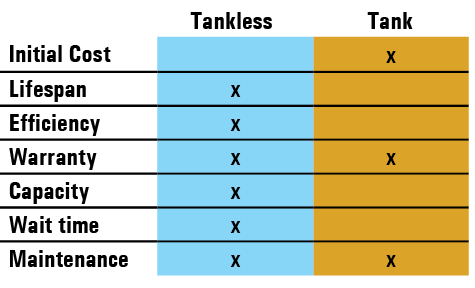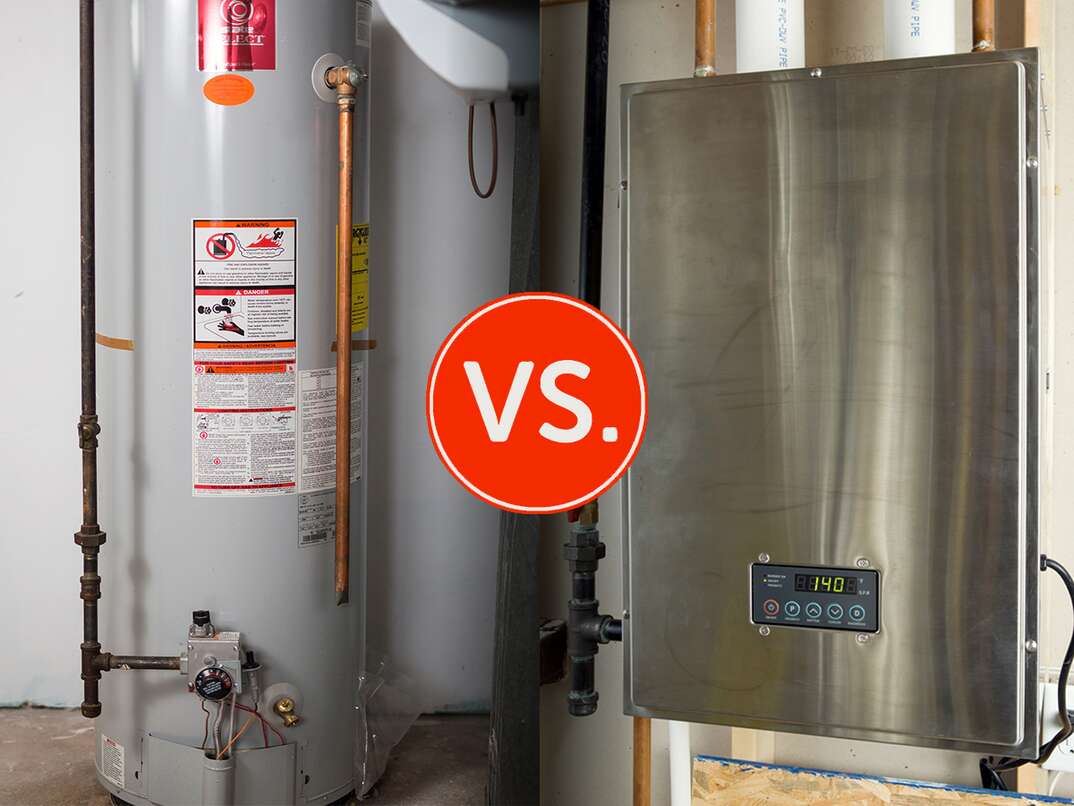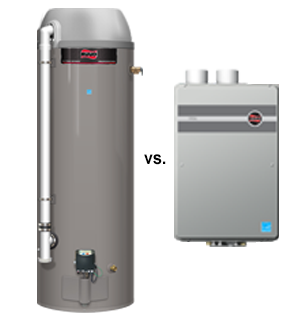Tankless vs Traditional Tank Water Heaters: Which Is Right for You?
Wiki Article
Discovering the Advantages of Tankless and Tank Water Heaters in Plumbing Systems
Are you tired of running out of warm water in the center of your shower? With a tankless water heater, you'll never ever have to worry regarding running out of warm water again.
Exactly How Tankless Water Heating Units Work
Unlike traditional water heating units that keep and warm a large quantity of water in a storage tank, tankless water heating systems give hot water on need. When you transform on a hot water tap, cold water flows and gets in the unit with a warmth exchanger.The trick benefit of tankless water heating systems is their energy efficiency. Considering that they only heat water when it is needed, they get rid of the standby heat loss that accompanies standard storage tank heating systems. This indicates you can delight in warm water without throwing away power and cash on continuously reheating water in a large storage tank.
An additional benefit of tankless hot water heater is their small dimension. They take up a lot less area compared to standard container heaters, making them ideal for little homes or apartment or condos with restricted storage space.
It is necessary to note that tankless hot water heater have limitations. They have a limited flow rate, implying they might struggle to supply hot water simultaneously to multiple electrical outlets in your house. By setting up multiple units or selecting a version with a higher flow rate, you can overcome this constraint.
Advantages of Tankless Hot Water Heater
When thinking about the advantages of tankless hot water heater, you will certainly find that they provide various advantages for your plumbing system. Among the primary benefits is energy efficiency. Unlike traditional storage tank water heating systems that frequently warmth and shop water, tankless hot water heater just warmth water as it is required. This indicates that you are not throwing away energy heating and reheating water that you might not use. Because of this, you can save a considerable quantity of cash on your energy bills.One more advantage of tankless water heating systems is their small dimension. Unlike bulky container water heating systems, tankless versions are small and can be mounted in limited areas. This is especially useful for homeowners who have actually limited room or wish to optimize their storage locations.

Tankless hot water heater additionally use a continual supply of warm water. Because they heat up water as needed, there is no need to wait for a container to reheat and replenish. This implies that you can take pleasure in warm water whenever you require it, without the fear of running out.
In addition, tankless water heating systems have a longer lifespan contrasted to standard tank hot water heater. While tank versions typically last around 10 to 15 years, tankless water heaters can last as much as twenty years or even more with proper maintenance. This suggests that you won't have to bother with replacing your hot water heater as regularly.
How Container Water Heaters Job
Tank water heaters work by keeping and heating a big quantity of water in a container - Tankless vs. Traditional Tank Water Heaters. Cold water goes into the tank through a pipeline linked to the major water supply when you turn on the hot water tap. Inside the storage tank, there is a burner, generally powered by electrical energy or gas, that heats the water to the desired temperature level. As the water warms up, it increases to the top of the storage tank, ready to be used whenever you need it.To make sure that the water remains at the preferred temperature level, container water heaters are outfitted with a thermostat. When the temperature level drops listed below the established degree, this gadget keeps track of the temperature level of the water and activates the home heating aspect. Once the water gets to the preferred temperature again, the home heating component switches off to preserve energy.

Advantages of Tank Water Heaters
One benefit of container water heaters is that they offer a trusted and cost-effective service for home heating water in your house. Unlike tankless water heaters, which heat water on need, container water heaters shop and warmth a big quantity of water, making certain a continual supply of warm water whenever you require Click This Link it. This is especially useful for homes with numerous occupants or high water use.In regards to cost-effectiveness, tank hot water heater are usually much more inexpensive to mount and purchase compared to tankless hot water heater. They likewise have a longer life expectancy, typically lasting around 10-15 years, which means you will not have to replace them as frequently. Furthermore, container water heating systems are typically much easier and more economical to fix, as they have easier systems and less parts.
One more benefit of tank water heating systems is their versatility. They can be powered by electricity, gas, or lp, allowing you to choose the alternative that best suits your demands and availability in your location. This versatility makes certain that you can locate a storage tank hot water heater that fits your spending plan and power preferences.
Picking the Right Hot Water Heater for Your Requirements
To ensure you pick one of the most appropriate water heating system for your demands, take into consideration the different factors that influence your decision. The first thing to think about is the dimension of your family and the amount of warm water you normally use. Storage tank water heating systems can be found in different dimensions, so it is very important to pick one that can meet your warm water demands. If you have a bigger home with multiple restrooms and home appliances, you might need a bigger tank to guarantee an adequate supply of hot water.Tankless water heating systems are known for their energy-saving capabilities. They only heat water when it is needed, which suggests they do not lose energy maintaining a continuous supply of hot water like typical her explanation container water heaters do.
Additionally, think about the upfront price and installment demands - Tankless vs. Traditional Tank Water Heaters. Tankless water heaters often tend to be extra pricey than container hot water heater, yet they have a longer lifespan and might offer better energy savings in the future. Setup can also be more complex for tankless water heaters, as they call for special ventilation and might need upgrades to your electric or gas systems
Verdict
Finally, both tankless and storage tank water heating systems have their advantages in pipes systems. Tankless hot water heater supply on-demand hot water and save space, while container water heating systems have a reduced upfront price and can deal with multiple warm water needs concurrently. Picking the ideal water heater for your demands depends upon aspects such as spending plan, area, and warm water usage. Consider your details demands and seek advice from a specialist to make the most effective decision for your pipes system.Unlike traditional water heating systems that store and heat a large quantity of water in a tank, tankless water heating systems supply warm water on need. Unlike traditional container water heating units that frequently warm and shop water, tankless water heaters only warmth water as it is required. When you transform on the hot water faucet, cold water gets in the storage tank via a pipeline connected to the primary water supply. Unlike tankless water heating units, which heat water on need, go to this web-site storage tank water heating units store and warmth a large volume of water, guaranteeing a continual supply of warm water whenever you need it. Tankless water heating systems supply on-demand hot water and conserve area, while container water heating systems have a reduced upfront cost and can handle numerous hot water demands at the same time.
Report this wiki page